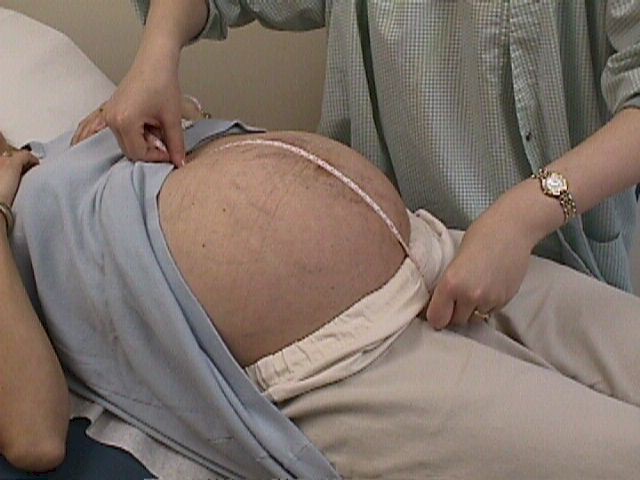|
If
everyone had normal, regular periods, every 28 days, and
could remember exactly when their last period was, and
ovulation always occurred on day #14 of the menstrual cycle, then
gestational age determination would be easy. These assumptions, however,
are not always the case. In real life, determining gestational age can be
challenging.
The estimated delivery date is calculated by adding 280 days to the
first day of the last menstrual period. An alternative method of determining the
due date is to add 7 days to the LMP, subtract three months, and add one year.
These calculations are made easier with the use of a pregnancy wheel or
Gestational Age Calculator.
 One way to approximate a pregnancy's current gestational
age is to use a tape measure to determine the distance from the pubic
bone up over the top of the uterus to the very top. That distance,
measured in centimeters, is approximately equal to the weeks of
gestation, from about mid-pregnancy until nearly the end of pregnancy.
This is known as MacDonald's Rule. One way to approximate a pregnancy's current gestational
age is to use a tape measure to determine the distance from the pubic
bone up over the top of the uterus to the very top. That distance,
measured in centimeters, is approximately equal to the weeks of
gestation, from about mid-pregnancy until nearly the end of pregnancy.
This is known as MacDonald's Rule.
If a tape measure is unavailable, these rough guidelines
can be used:
-
At 12 weeks, the uterus is just barely palpable above the
pubic bone, using only an abdominal hand.
-
At 16 weeks, the top of the uterus is 1/2 way between the
pubic bone and the umbilicus.
-
At 20-22 weeks, the top of the uterus is right at the
umbilicus.
-
At full term, the top of the uterus is at the level of
the ribs. (xyphoid process).
Ultrasound
can be used to determine gestational age. Measurement of a crown-rump
length during the first trimester (1-13 weeks) will give a gestational
age that is usually accurate to within 3 days of the actual due date.
During the second trimester (14-28 weeks), measurement of the biparietal
diameter will accurately predict the due date within 10-14 days in most
cases. In the third trimester, the accuracy of ultrasound in predicting
the due date is less, with a plus or minus confidence range of as much
as 3 weeks. A chart showing different ultrasound measurements at
different gestational ages in shown in the
Ultrasound Gestational
Age Measurements chart.
1st Trimester Ultrasound
Measurements
|
Gestational Age (Weeks) |
Sac Size |
CRL |
BPD |
|
4 |
3 |
|
|
|
5 |
6 |
|
|
|
6 |
14 |
|
|
|
7 |
27 |
8 |
|
|
8 |
29 |
15 |
|
|
9 |
33 |
21 |
|
|
10 |
|
31 |
|
|
11 |
|
41 |
|
|
12 |
|
51 |
21 |
|
13 |
|
71 |
25 |
|

MacDonald's Rule
(Cm of fundal height = weeks gestation)
 |
|